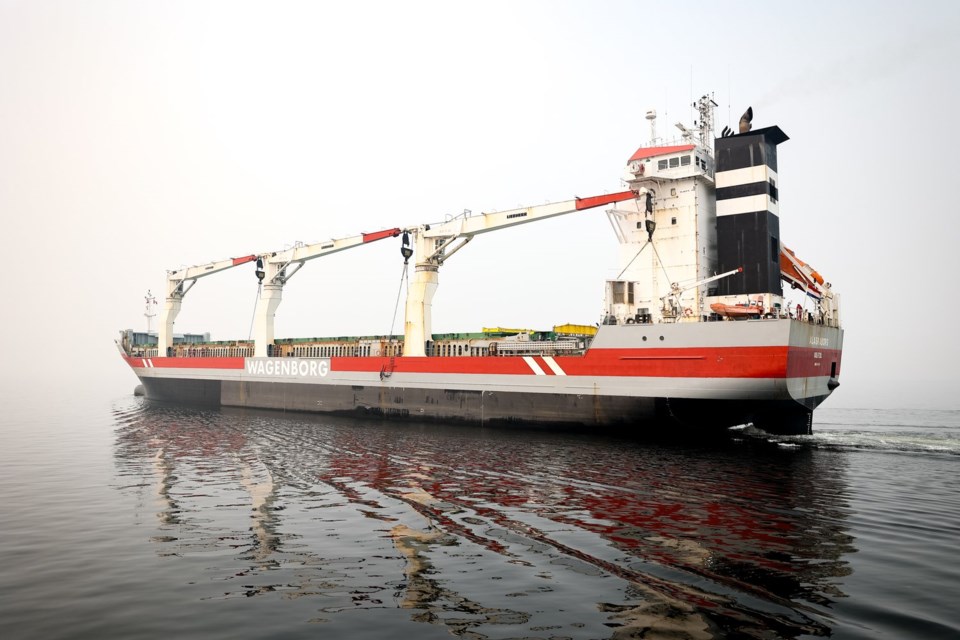A shipment of Manitoba minerals has been sent to sea through Churchill for the first time in over 20 years.
A ship loaded with zinc concentrate, mined at Hudbay’s Snow Lake-area Lalor mine, departed the port of Churchill August 16, part of a project between Hudbay and the Arctic Gateway Group (AGG), the operators of the port and Hudson Bay Railway. Over a hundred individual rail cars with zinc concentrate were sent to the port earlier this year, going from Snow Lake to Flin Flon, then to The Pas and onward to Manitoba’s sole open water port.
The deal between the two companies was first announced last December, with train cars of concentrate first being sent to Churchill in May. AGG built a new storage building at the port to keep the concentrate, which arrived in June. The company also oversaw a massive renewal campaign along the line, replacing well over a hundred thousand individual ties, resurfacing hundreds of kilometres of track and fixing crossings, bridges and turnout. The project also included replacing a key bridge near Thicket Portage and repairing several smaller crossings along the line.
“Hudbay has a long history of mining in Manitoba and is committed to supporting the northern economy. The port of Churchill provides us with an efficient gateway to deliver our products to global customers,” said Hudbay Manitoba business unit vice-president Rob Carter in a statement.
“We hope to build on this initial concentrate shipment to explore other mutually beneficial opportunities with AGG in the future.”
AGG operates both the Hudson Bay Railway and port of Churchill facilities. AGG is owned by OneNorth, a consortium of northern municipalities, Indigenous communities and First Nations. The City of Flin Flon is part of the OneNorth ownership group, having bought three ownership stakes in the group for one dollar apiece back in 2018.
“We’re building a new era of economic development and international trade for northern Manitoba while strongly supporting the principles of Indigenous reconciliation,” said AGG chair Mike Spence. Spence is also the mayor of Churchill while serving on the company’s board - AGG’s current director is former Flin Flon Mayor Cal Huntley.
“Thanks to the strong partnership that we have developed between the Indigenous and northern ownership group, the government of Canada and the province of Manitoba, we’ve been able to improve the reliability of our operations and secure new contracts to export Canada’s critical minerals to international markets.”
Federal and provincial cabinet ministers were on hand in Churchill for the ship’s seeing-off August 16.
“The collaborative work done between all levels of government and the leadership of the Arctic Gateway Group has paved the way for this historic day,” said Dan Vandal, federal minister for northern affairs.
“With a revitalized Hudson Bay Railway and port of Churchill, jobs will be created, mining and forestry opportunities will open and Bayline communities will have the opportunity to position themselves as a true gateway to the Arctic and the world.”
The ship taking the concentrate away is operated by Europe-based shipping magnate Royal Wagenborg - the ship is bound for Europe. As of Monday afternoon, the vessel was going across Hudson Bay towards the Hudson Strait.
AGG bought the rail line in 2018 after its previous owner left the line unused for more than 18 months when it was damaged in a flood, leaving the community of Churchill cut off from land transport. In 2022, the Manitoba government announced it would spend up to $73.8 million over two years to help upgrade the railway - the federal government already provided almost $160 million in funding to help repair and operate the railway, with commitments to add almost $60 million more this year.
The port is advertised as a quicker way for shipments from western Canada, including agricultural and industrial shipments, to get to open water and be shipped abroad. Requests have been made from western Canadian policy analysts and researchers to use the railway as part of a northern transport corridor that might potentially see oil or gas shipments being made from western provinces to Churchill through northern Manitoba.
During the August 16 unveiling, AGG also announced it had sent a second vessel out of the port last month with construction and resupply items, bound for communities in Canada’s Arctic. The company also plans to expand the port, buying new handling equipment and further upgrading the railway.
By 2028, AGG hopes to reduce shipping time and costs between international market, support over 5,500 total jobs and generate over $1 billion in economic activity in Canada.




